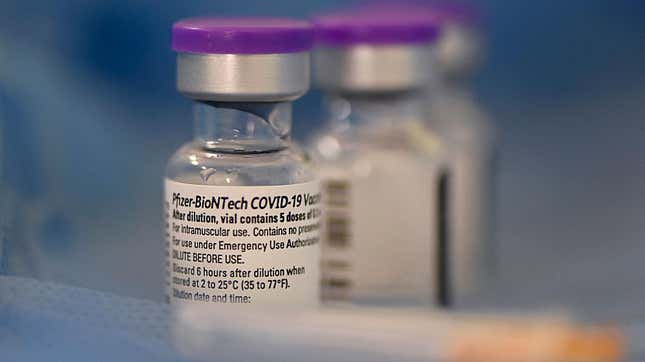
On Monday, the Food and Drug Administration gave its full approval to Pfizer and BioNTech’s covid-19 vaccine, which has until now been covered under an emergency use authorization. It’s now the first of its kind approved in the U.S.—a decision that public health experts say could improve its acceptance among those still hesitant to take it, as well as allow for smoother enforcement of mandates among private businesses, colleges, and other organizations. The shot also has a new name: “Comirnaty” (pronounced koe-mir’-na-tee).
Rumblings of the approval emerged late last week, following initial reports that a decision may not arrive until later in the year. Some scientists have been calling for approval as early as July, citing the months of quality data collected since late late year, when Pfizer/BioNTech’s vaccine was the first to be given an emergency use authorization in the U.S. Since then, two other vaccines, developed by Moderna and Johnson & Johnson, also received emergency use authorization by the FDA.
As first reported by the New York Times, Comirnaty has been approved for everyone over the age of 16, mirroring the initial EUA given last December. The approval was based on data from over 44,000 participants in the clinical trials used to evaluate the vaccine. This data found that the two-dose vaccine has so far provided 91% effectiveness against symptoms from the coronavirus, down from the 95% originally calculated in the lead-up to its EUA. (The emergence of new variants in 2021 has likely lowered this effectiveness somewhat.)
“The FDA’s approval of this vaccine is a milestone as we continue to battle the COVID-19 pandemic. While this and other vaccines have met the FDA’s rigorous, scientific standards for emergency use authorization, as the first FDA-approved COVID-19 vaccine, the public can be very confident that this vaccine meets the high standards for safety, effectiveness, and manufacturing quality the FDA requires of an approved product,” said Acting FDA Commissioner Janet Woodcock in a statement released by the agency.
The period of time included in the analysis (up to six months after the second dose) covers the emergence of several variants. But it’s possible that the vaccine may be noticeably less effective at preventing symptoms from Delta specifically, which has now become the most dominant form of the virus in the U.S. Importantly, however, evidence indicates that all of the vaccines continue to provide very high protection against severe illness and death from covid-19.
Public health experts have argued that approval should lessen remaining hesitancy about vaccination, as polls of the vaccine-hesitant have shown some concern about taking a vaccine not fully approved by the FDA. Moreover, the move should pave the way for schools, businesses, and local governments to more easily enact requirements for vaccination among their employees without legal challenges. Mandates already exist for colleges and universities regarding other fully approved vaccines, such as ones against certain forms of meningitis. This same morning, New York City announced that all public school employees would be required to get vaccinated.
Currently, about 51% of the country has been fully vaccinated, a rate lower than other highly vaccinated countries such as Canada.
It’s not clear what the timeline will be on approval of the other two vaccines, though Moderna has filed for approval. The FDA is also still evaluating the approval of the Pfizer vaccine for teens 12 to 15, which is still covered by the EUA. Future EUAs may yet cover vaccine use for younger children, as well as booster shots. Recently, the government signaled that it would seek to sanction booster shots by mid-September for people given either mRNA vaccine eight months after their second dose.